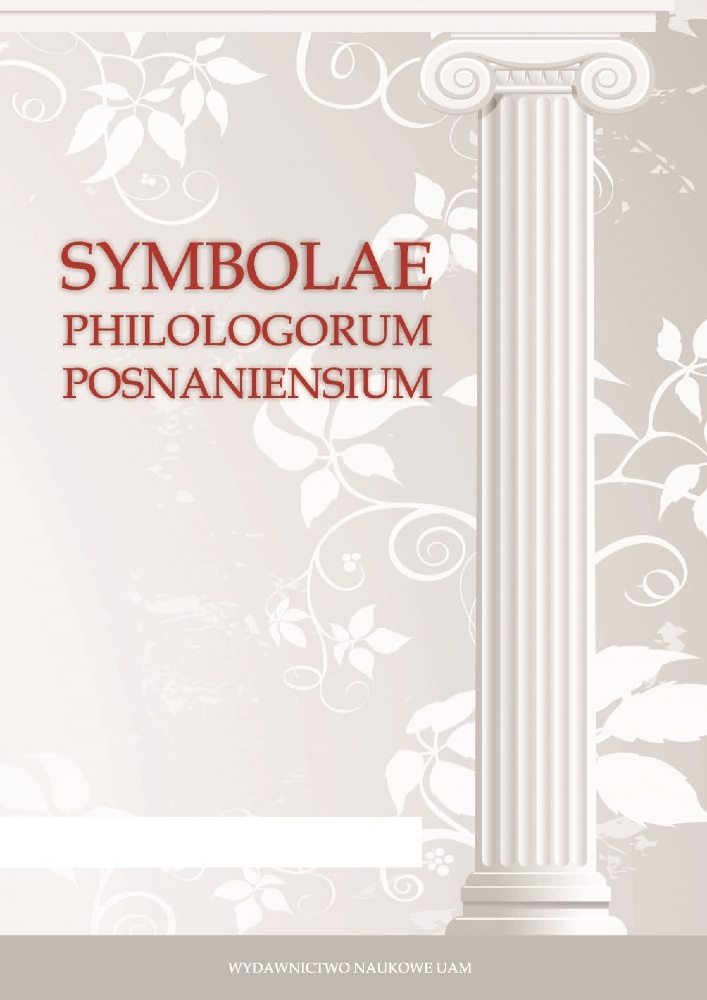Abstrakt
The article aims to examine the tragedies: Ήρακλής μαινόμενος by Euripides and Hercules Furens by Seneca and exactly the different types of the madness, by which the main character is overcome in the above mentioned dramas. Although the article touches also on the issue of the insanity sent to the hero by Hera/ Juno, concentrates especially on the fit of madness, that is here defined as a human madness.Bibliografia
Euripides, Hercules, edidit K. Hargreaves Lee, Leipzig 1988.
Seneca’s tragedies, with English translation by F.J. Miller, London–New York 1927.
Sophoclis Tragoediae, T. I, Aiax, Electra, Oedipus rex, iterum edidit R.D. Dawe, Leipzig 1984.
Bates W.N., Euripides: A student of human nature, New York 1969.
Brill's Encyclopedia of the Ancient World, New Pauly, red. H. Cancik, H. Schneider, Antiquity, t. 8, Leiden–Boston 2006.
Burkert W., Structure and History in Greek Mythology and Ritual, Berkeley 1979.
Cairns D.L., The Psychology and Ethics of Honour and Shame in Ancient Greek Literature, New York 1993.
Eliot T.S., Szekspir i stoicyzm Szekspira, [w:] Kto to jest klasyk i inne eseje, przeł. M. Heydel, Kraków 1998.
Fitch J.G., Pectus O Nimium Ferum: Act V of Seneca’s „Hercules Furens”, „Hermes” Bd. 107., H. 2, 1979.
Franzino E., Euripides’ Heracles 858 – 873, ICS 20, 1995, 57–63.
Garrison E.P., Groaning Tears. Ethical & Dramatic Aspects of Suicide in Greek Tragedy, Leiden 1995.
Grimal P., Słownik mitologii greckiej i rzymskiej, Wrocław 1987.
Hartigan K., Euripidean madness: Hercules and Orestes, ,,Greece & Rome” (Second Series) 1987, 34.
Jamroz W., Stoicka inspiracja sztuki Seneki ,,Herkules furens”, ,,Eos” LX, 1972.
Karamucka M., Dzieciobójstwo jako wyzwanie dla dramatu, ,,Classica Wratislaviensia” XXXI, 2011.
Ker J., The Deaths of Seneca, Oxford 2009.
Kitto H.D.F., Tragedia grecka. Studium literackie, przeł. J. Margański, Bydgoszcz 1997.
Motto A.L. i Clark J.R., Maxima Virtus in Seneca’s „Hercules Furens”, „Classical Philology” vol. 76, no.2, 1981.
Papadopoulou T., Heracles and Euripidean Tragedy, Cambridge 2005.
Ripa C., Ikonologia, przeł. I. Kania, wyd. II, Kraków 2002.
Schade G., Social memory and its literary forms in greek epic nad tragedy, ,,Symbolae Philologorum Posnaniensium” XXII, 1, 2012.
Sieradzan J., Szaleństwo w religiach świata: szamanizm, religia starogrecka, judaizm, chrześcijaństwo, hinduizm, buddyzm, islam, Kraków 2005.
Silk M.S., Heracles and Greek Tragedy, „Greece & Rome”, 2nd series, vol. 32, no. 1, 1985.
Simon B., Mind and Madness in Ancient Greece. The Classical Roots of Modern Psychiatry, London 1978.
Słownik mitologiczny z przyłączeniem-obrazo-pismu (Jconologia) układu X. Aloizego Osińskiego Professora Literatury w Gimnazjum Wołyńskiem, E=N t. II, w Warszawie 1808.
Stróżyński M., Zjawiska psychotyczne w ,,Heraklesie” Eurypidesa ,,Symbolae Philologorum Posnaniensium” XXI, 2, 2011.
Suchańska A., Krysińska K., Samobójstwo – perspektywa psychologiczna, Konin [ca 2003].
Węclewski Z., Wstęp do: Eurypides, Herakles szalony, Poznań 1882.
Yoshitake S., Disgrace, Grief and Other Ills: Herakles’ Rejection of Suicide, ,,The Journal of Hellenic Studies”, vol. 114, 1994.
Licencja
